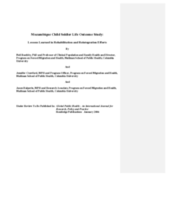As the use of child soldiers continues to proliferate throughout the world, it is integral that effective psychosocial interventions are developed and critically evaluated. This research shows that former child soldiers who are provided rehabilitative services and accepted back into their families and communities will become productive, responsible and caring adults.
In 1988, 39 captured or escaped child soldiers were brought by the Mozambican government to the Lhanguene Rehabilitation Center in Maputo – Mozambique’s capital city. Interventions that focused on rehabilitating the children both psychologically and physically were initiated during their six-month stay at the Lhanguene center as well as for two years after they returned to their families and communities. This research investigated the adult outcomes of these former child soldiers sixteen years after returning home, paying particular attention to their psychological and social functioning. The study, which included qualitative and quantitative data to assess the psychological health, as well as the social and economic well-being of these former child soldiers as adults, was designed to evaluate the interventions and make recommendations for future efforts to assist young combatants returning to civilian life.
©Routledge Publications

